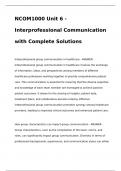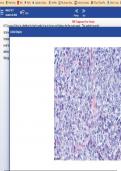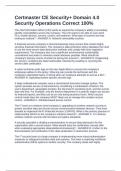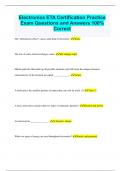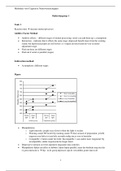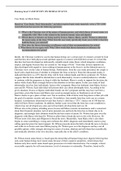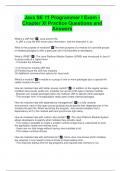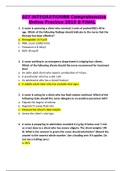Interprofessional Communication
with Complete Solutions
Interprofessional group communication in healthcare - ANSWER-
Interprofessional group communication in healthcare involves the exchange
of information, ideas, and perspectives among members of different
healthcare professions working together to provide comprehensive patient
care. This communication is essential for ensuring that the diverse expertise
and knowledge of each team member are leveraged to achieve positive
patient outcomes. It allows for the sharing of insights, patient data,
treatment plans, and collaborative decision-making. Effective
interprofessional group communication promotes synergy among healthcare
providers, leading to improved clinical outcomes and enhanced patient care.
How group characteristics can impact group communication - ANSWER-
Group characteristics, such as the composition of the team, norms, and
roles, can significantly impact group communication. Diversity in terms of
professional backgrounds, experiences, and communication styles can either
, enhance or hinder communication. Group norms, whether universal or
specific, set the expectations for behavior within the group and can either
facilitate open and effective communication or create barriers. Additionally,
the roles of team members and the degree of role clarity affect how
information is shared and received within the group.
Stages of group development process - ANSWER-- Forming: Team members
are introduced to each other, and trust is built. Goals and expectations are
clarified, and universal norms for group behavior are established.
- Storming: Conflict may arise as team members delve deeper into their
objectives and power dynamics. This stage involves challenges to existing
perspectives and may require resolution.
- Norming: Team members begin to identify as part of the team, and shared
goals prevail. Group-specific norms are established and enforced.
- Performing: This stage is characterized by creative and productive work,
with ideas flowing freely. Team members collaborate effectively and are
comfortable taking risks.
- Adjourning (Termination): This stage marks the completion and closure of
the group's work, including reflection on accomplishments and future plans.

